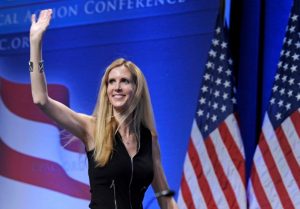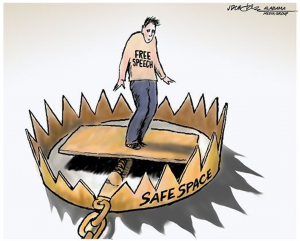What has happened to America’s once free-thinking universities?
What has happened to campuses that once fostered wide open debates on all topics, not just those deemed “safe” by school administrators or those that partisan and blinkered professors favor and endorse?
Since when did students at colleges need to be provided with “safe spaces” where controversial ideas and political philosophies they may not agree with are not to be debated or even mentioned?
What happened to the idea of bringing controversial viewpoints, concepts, and theories into the academy where they can be thoroughly and rationally examined and considered?
In short, what happened to the notion of academic freedom, which in essence says that scholars and students should have the freedom to teach or communicate ideas or facts (including those that are inconvenient to external political groups or authorities) without being targeted for repression, termination, physical attack, or imprisonment.
It appears that the concept of academic freedom, which has its roots in the medieval European university, is on a respirator in the United States.
Conservative speakers are under fire on college campuses, and critics say school officials who should be fostering a climate of intellectual diversity are instead siding with violent groups out to shut down free speech.
The ongoing controversy at the University of California, Berkeley involving a planned speech by conservative pundit Ann Coulter is the latest example of a school caught between provocative speech and the threat of reactionary violence.
“You cannot impose arbitrary and harassing restrictions on the exercise of a Constitutional right,” Coulter said during a recent television interview.

School officials wanted to avoid a replay of the Milo Yiannopoulos incident a few months ago, in which masked vandals did more than $100,000 worth of damage, setting fires and breaking windows in protest of the anticipated speech by the conservative pundit.
That was followed by a violent attack on conservative author Charles Murray during a speech at Vermont’s Middlebury College.
Many are blaming the violent protests targeting conservative speakers on the alt-left group Antifa. Critics say Antifa, a group that calls itself “anti-fascist,” has sparked violence on college campuses across the country to further its far left agenda.
The great irony of groups like Antifa is that they are the “book burners” of today. They are behaving like the Brown Shirts of 1930s Germany who shut down free speech, burned books they found anathema to their twisted philosophy, torched buildings, and employed physical violence that led to injury and death.

In the UC Berkeley riots that broke out recently, pictures and video were tweeted out of rioters beating people with “Antifa” flagpoles and then drenching them with pepper spray. Naturally, cowardly Antifa rioters, like ISIS terrorists, wear masks to conceal their identity.
Kyle Shideler, Director of the Threat Information Office at the Washington D.C.-based think tank Center for Security Policy, says Antifa traces its roots back to Antifaschistische Aktion, the street fighting wing of the German Communist Party in the 1920s and 1930s.
The question is this: who are the real fascists? Conservatives who are prohibited from exercising their free speech rights? Or the Antifa androids out to muzzle anybody who thinks and speaks counter to what they consider “correct speech?”
“Increasingly college campuses have become bastions for radical leftist politics, Shideler said. “If an individual’s freedom of expression is viewed as inherently ‘unsafe’ or ‘dangerous’ by these colleges, then it creates a milieu where the violent resistance to such speech is regarded as legitimate. Antifa routinely takes credit for such violent activities.”
Are universities doing enough to stop the violence? Are they holding those responsible for the violence accountable?
It doesn’t look like it.
UC Berkeley admitted in a recent interview that a university employee who took part in the February riots and who later boasted in a tweet about beating up a Trump supporter at the event remains on the university payroll.
By not taking the proper steps to stop the violence, some say, universities are letting those suppressing free speech win the war against the First Amendment.
It is setting a dangerous precedent in a nation that has traditionally championed the right to assemble peacefully and speak freely.
Manhattan Institute fellow Heather MacDonald, who writes about police and law enforcement in America, said when she was on her way to a roundtable at Claremont McKenna College in Southern California, she had to be escorted past throngs of protesters.
“There was a blockade of 250 and 300 students who prevented other students from entering. I gave my talk to an almost empty room. During the talk the protesters banged on the plate glass windows,” said MacDonald. She said there was a Facebook posting ahead of her event that called for protesters to “shut down the white supremacist fascist Heather MacDonald.”
Ultimately, she said, they got their wish.
“It was the threat of brute force,” she said, “The police decided they couldn’t guarantee our safety and I was told it was over and I was hustled out of the building under police protection.”
Is it time for the Trump Administration or Congress to step in?
“I think an argument can be made that there is a compelling government interest in restoring safety and free exchange of ideas on college campuses, or at a minimum, in reducing or ending government funding for institutions of higher education which refuse to defend student and faculties free speech rights,” said Shideler.
Have we reached the point in American history that people must risk life and limb in order the exercise their rights under the First Amendment?
As a former professor and dean at the University of Illinois, I find myself wondering how effective universities are in educating students if they decide that only one side of a political or social or economic issue is allowed to be taught and discussed.
One has to wonder where the press is on this issue. After all, if any entity in our country should be concerned about the lack of free speech on college campuses, it should be the news media which is free precisely because there is a First Amendment, not in spite of it.
I am sad to say that America is rapidly becoming an intolerant nation that I no longer recognize.



